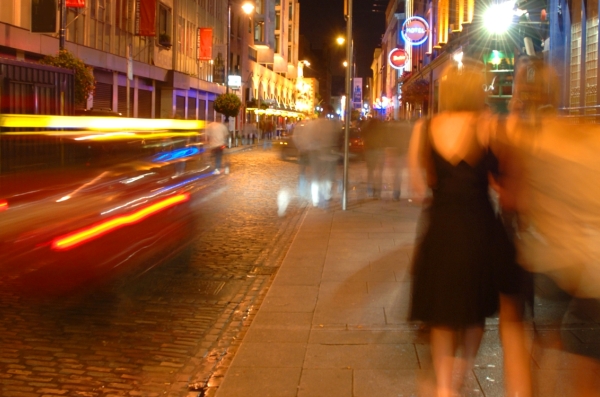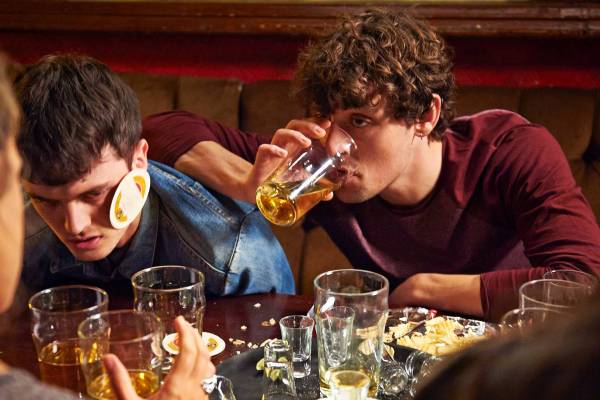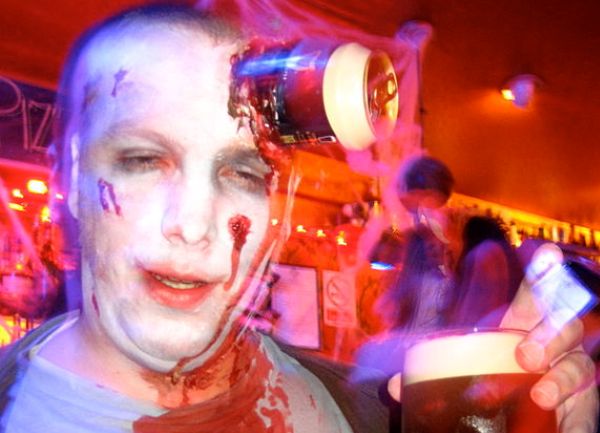Are the young London Irish anything like Channel 4’s new TV show and what do they get up to on a night out? Niall O’Sullivan finds out.
IT BEGINS in a corner shop — the first sign emerges that we have crossed the border into County Clapham.
“Ah shore, yannow, Oi nehvur haird dat wun,” says a Dubliner to his friend in the queue. The Clapham North Underground sign glows behind them, out a sticker-clad window, against a moonless charcoal sky.
The young men continue chatting about music while they wait to be served. And as the other speaks, it turns out they are a pair of Dubs.
It’s not clear what Kodaline song the first had not heard. But it is clear these two are out for the night. The taller Dub stands clutching an azure plastic bag that creaks and loses its colour under the weight of 12 lager cans.
His friend approaches the counter and asks for a large packet of tobacco, but the Indian shopkeeper cannot make out his request.
He repeats himself and pays while turning to his friend, who groans as he yanks his beer bag off the floor. The door dings as they open it to leave and it dings again before shutting behind them.
Were those lads the ‘London Irish’ — the obnoxious, foul-mouthed and feckless new entrants to England’s capital depicted in this week’s Channel 4 sitcom?
As far as the shopkeeper is concerned, they are just two of the many. “We get so many Irish in here,” he says. “All my regular customers are Irish. There are so many here now — more and more all the time.”
But do they match up to the hard-drinking fools being beamed into British televisions every Tuesday night?
“They like whiskey,” the shopkeeper says. With a broad grin he points to the bottles of Jamesons and Bushmills over his right shoulder. It is a different kind of Irish aisle to the one that overflows with Taytos, Barry’s Tea and Fig Rolls in the local supermarket.
And it was probably there long before the onset of the most recent economic crash to fling emigrants to all corners of the globe.
Official figures don’t exist for how many of those flung Irish have landed in Clapham, but conventional wisdom puts the figure in the thousands.
If their voices do not echo all the way down Clapham High Street, it is only because few noises are given a fair shot at becoming discernible at 9.30 on a Saturday evening.
The most memorable thing about the now moonlit broadway is the sight of hundreds of bodies penned in behind barriers that mark out the territory of its bars and clubs.
 A scene repeated on Saturday nights all around the country
A scene repeated on Saturday nights all around the countrySome of the captors are chatting, most are flirting and some look like they should have lined their stomachs a little more before hitting the hard stuff.
But down by Clapham Common, in The Alexandra pub, ears perk up when they are assaulted from all sides by a barrage of Irish accents.
If we are in County Clapham, this is its county town.
***
THE WELCOMING party takes the form of four girls from the North of Ireland walking out the Alexandra’s doorway.
One, a peroxide blonde, is particularly audible as she shouts to her friends while doing that high-heeled stride that is part-Bambi-on-ice, part-velociraptor.
Inside, it is like another world. Or more precisely, another country.
A Kerryman leans in at the bar and orders his drink as Dolly Parton’s Jolene blasts out of the speakers.
Noticing that the barman too is Irish, he asks where he is from. “Wexford!” “Did you see the Dublin Kerry game?” the patron asks. “Nah I didn’t manage to.”
“Aw you shouldn’t have missed it. It was such a close game.”
Over on the other side of the bar, five lads huddled around a table scream out the lyrics to the next song on tonight’s playlist.
“I SAID I BET THAT YOU LOOK GOOD ON THE DANCEFLOOR!”
And where would they be from? “Well we’re from Ireland,” says their self-appointed ringleader, a twenty-something engineer, pointing to himself and the man to his left.
“But those lads aren’t really Irish,” he adds with a flick of his hand in the direction of their companions.
“They are from the North!” They all laugh before the ringleader clarifies that he and his ‘Irish’ mate are from Tipperary, while the others are from Tyrone.
To him it is not in the least bit strange that this enclave of Eire should exist in 21st century London.
“This is like a home away from home,” he explains. “When you come here and know nobody, you always want to go somewhere you feel at home.”
He pauses for thought before realising how to make his point: “It is like when the English go on holiday. They go to English places!”
“I SAID I BET THAT YOU LOOK GOOD ON THE DANCEFLOOR,” his friends interrupt.
“There are a lot of people coming over on their own now. Just look at us. I met these guys at the Wimbledon Irish Centre.
“And we’re still coming to The Alexandra together 12 months later.”
So these guys are the ‘London Irish’, right? “Actually this is an AA meeting you should know,” the ringleader laughs before gulping down the rest of his pint.
Just above his head hangs a framed Dublin GAA jersey. It is one of the confident and subtle embellishments that whispers suggestions of this tavern’s identity, like the fluorescent Tayto packets behind the bar and the inflatable Guinness pint stored high above them.
The scene contrasts strongly with an ‘Irish-themed’ pub across the road, where whispers are declined in favour of big bold outbursts of Irishness.
 How close to reality are the characters portrayed in Channel 4's London Irish?
How close to reality are the characters portrayed in Channel 4's London Irish?Celtic font gives you ‘mile fáilte’ on the way in, a bodhrán is nailed to one wall while some fiddlers ‘havin’ the craic’ keep watch from another and an English rugby shirt hangs awkwardly beside its Irish equivalent behind the bar.
Back in the Alexandra, a rugged ginger guy enters wearing an “I shamrock The Swan” T-shirt.
Barging his way through to the bar, he passes a poor green-jumpered fella who has won little more than a giggle from the young woman he’s been trying to chat up for 20 minutes.
He stops just short of the fruit machine, where an older man is busy waging war on a wall with a deeply drunken stare. His name is Conor.
He left Galway for London during Ireland’s last mass exodus. Around the corner stand two bombshell brunettes.
“Lots of the Irish are quite insular in their approach to meeting and socialising with non- Irish,” says Cavan girl Aoife.
“They can actually be quite narrow-minded, like, a lot of them have not seen people from other races,” she adds with inflection.
“Yanno? I notice that a lot at work (as a radiographer in an NHS hospital).”
“What?” Emma disputes, putting down her vodka coke with a forceful splash. “We have to integrate! “Most of the people I work with (as a waitress) are English or Polish. That is why we come back to Little Ireland.
“You come here because you know it’s the only place you will meet other people in the same boat as you!”
***
OUT in the smoking area a very different discussion is unfolding, one that brings up memories of an episode in Irish history that most would rather forget.
“We hate you Schillaci! We hate you Schillaci,” sing John and Mark, another pair of Dubliners, at the Italian sitting opposite them at a sticky wooden table.
The Italian smiles and bumbles out halfsentences in a poor attempt to return the banter. “We had just beaten Romania,” says John. “It was the quarter-final of the World Cup — in Rome! That is the best we have ever done.
“And I remember watching it on the TV. I remember watching the bleedin’ Romania penalty shoot-out on TV! But you Italians had to come and ruin it. “F**king Schillaci.”
Again the Italian smiles and laughs as if he knows not whether to console his new friends or laugh back at them. Instead he kisses his girlfriend.
“Why do you guys have to be so romantic?” Mark retorts. “You make us Irish look bad.”
But John was not finished with the previous discussion. “You remember ’94 though don’t you though,” he offers with a smile. “RAY HOUGHTON! We know who Schillaci is but do you remember Ray Houghton?”
Of course he doesn’t. “Well he is the guy who…” John lofts his hand up and glides it through the air before slapping it back down on the table.
“…lobbed your keeper. Ireland 1! Italy nil!” No jokes about paedophilia — or the ethics of snogging a corpse at a funeral — or Protestants.
There’s none of Channel 4’s London Irish here. Except that there is another story of London-Irishness to be told by Mark.
***
AS his more boisterous friend returns inside, Mark, a frail and bespectacled man dressed plainly in boot cut jeans and a navy T-shirt, stays out in the cold to finish his cigarette.
Instantly he looks wearier than he did just minutes before. “You know I never thought I would emigrate,” he says after reclining his pale head to release a cloud of smoke into the air. “But that is how a lot of people feel.
“I was actually at the All-Ireland final (in 2011) the day before I left and ran into Shane MacGowan in the bar. I swear to God that’s true.
“That man is a poet. Here we are in London, still ‘celebrating the land that made us refugees’. And we’ll be doing that even more next week for the All- Ireland.”
It’s not that Mark is ranting, but his steady stream of consciousness continues for several minutes.
“I’ll tell you something: Ireland’s Catholic guilt is a real problem and they are paying for it now. The thing is that the Government at home has always been very right wing. They will produce these stats about unemployment but they won’t mention emigration.
 A scene familiar to the Swan - a popular Irish late-night hangout in south London
A scene familiar to the Swan - a popular Irish late-night hangout in south London“And even over here the Irish are…”
He pauses for about 10 seconds. Another drag. Another puff.
“…Begrudgers. The Irish won’t help you. I’m trying to get work as a solicitor but all I am getting is legal assistant stuff, so I have to do free work.”
Pointing over his shoulder into the pub he adds: “The only people to have helped me over here are actually those guys — Italians.”
He tosses his stub aside and trudges back into the pub as a beckoning John appears at the door.
It’s last orders. Meanwhile, two girls, from Derry and Galway, balk at the popular view that emigration is a journey beset by angst.
“People keep saying we are ‘crying into our teacups,’” says one as she hunches into what must be the ‘poor-emigrant’ pose. “But we aren’t!”
“I am really glad to be over here,” adds her friend. “I only call home so my Mum and Dad know I am alive!”
***
“CLEEENA! Cliona! Oh my gawwwwwwd!’ screams an Irish girl as she’s dragged through the doorway.
“I didn’t even do anything wrong!” With her clasped hands finally pried from the door by a bouncer, a security guard lifts a metal gate and escorts her out of the building.
She tries to walk forward, but stumbles left and then right. With another outburst she accepts her fate and turns to wander off into the night.
We have long since left County Clapham’s county town for The Swan, another of its busy metropolitan areas, which stands proudly on a corner of the high street’s Stockwell end.
Up a narrow staircase, an incomprehensible mass of sweaty bodies bounce and ricochet under dimmed lights to tame club songs.
Above them Irish flag bunting hangs between chandeliers. More plastic Tricolours are crossed behind the bar. The accents seem more diverse in The Swan, but its status as a ‘London Irish’ venue is unquestionable.
That diversity extends to the patrons. A suited middle-aged guy leaves the bar, revealing a Munster-jersey-and-jacket-clad young man slumped in the corner, pint-in-hand, on the verge of falling to the floor.
Several Irish girls look on from the comfort of a couch, arguing about whether to enter the fray. Drunken stares abound.
Downstairs it is much the same, except sweatier. The DJ, who is wearing a green flat cap, bobs along with glee to his late-90s-meetsearly- noughties soundtrack.
“WHAT’S THAT COMING OVER THE HILL? IS IT A MONSTER? IS IT A MONSTER?”
Sticky carpets line the route to the smoking area, where scores of Irish talk with a sprinkling of Polish and English. Many of the latter may well be second-generation Irish, but one seems more likely than the others.
He unzips his tracksuit top to unveil a leprechaun shirt. Mr Munster is there too, apologising in intoxicated slurs for his hyperactive friend’s desire to greet everyone who passes through the door.
“You know I can tell that someone is Irish just by looking at them,” says an English woman to her friend.
Meanwhile, two Cork women desperately try to flee a clingy drunk whose stare has turned from drunken to frightening.
“OH MY GOD! My first cousin,” says one, slinging her arm around an unsuspecting man. Their conversation continues long after the pest returns inside.
The other Cork girl, a nurse, recounts a mystical journey last Halloween to The Swan’s lost and found, which sounds more like a treasure trove.
Her waterfall of consciousness continues, before ending with the most appropriate comment imaginable.
“I kissed the Blarney Stone, yanno?” she offers. “But then it cheated on me. He had other women. AND MEN!”
Back inside, the scene remains startlingly unchanged, and will do so until the early hours of Sunday morning.
“SOMEBODY TOLD ME, THAT YOU HAD A BOYFRIEND, WHO LOOKED LIKE A GIRLFRIEND…”
The London Irish night is ending, and the balance that marked its beginning has shifted. Most are chatting, some have progressed from flirting to snogging and plenty are stumbling.
Then the city itself offers a parting gift as a reminder of where we really are. Two well-dressed women emerge from a taxi beside The Swan.
As they walk up the high road, a tall hooded figure runs towards them. If you’ve seen it happen before, you know what comes next.
Like a rugby player, he rips their bags from their hands before disappearing without hesitation into the adjacent council estate.
High-pitched screams echo on the now quiet broadway. “HEEEEELP!” The girls look to chase their attacker, but emerge from the estate’s shadows a minute later with no bags.
The bus arrives, so it’s time to say goodnight to County Clapham.
Additional reporting: James Martin

